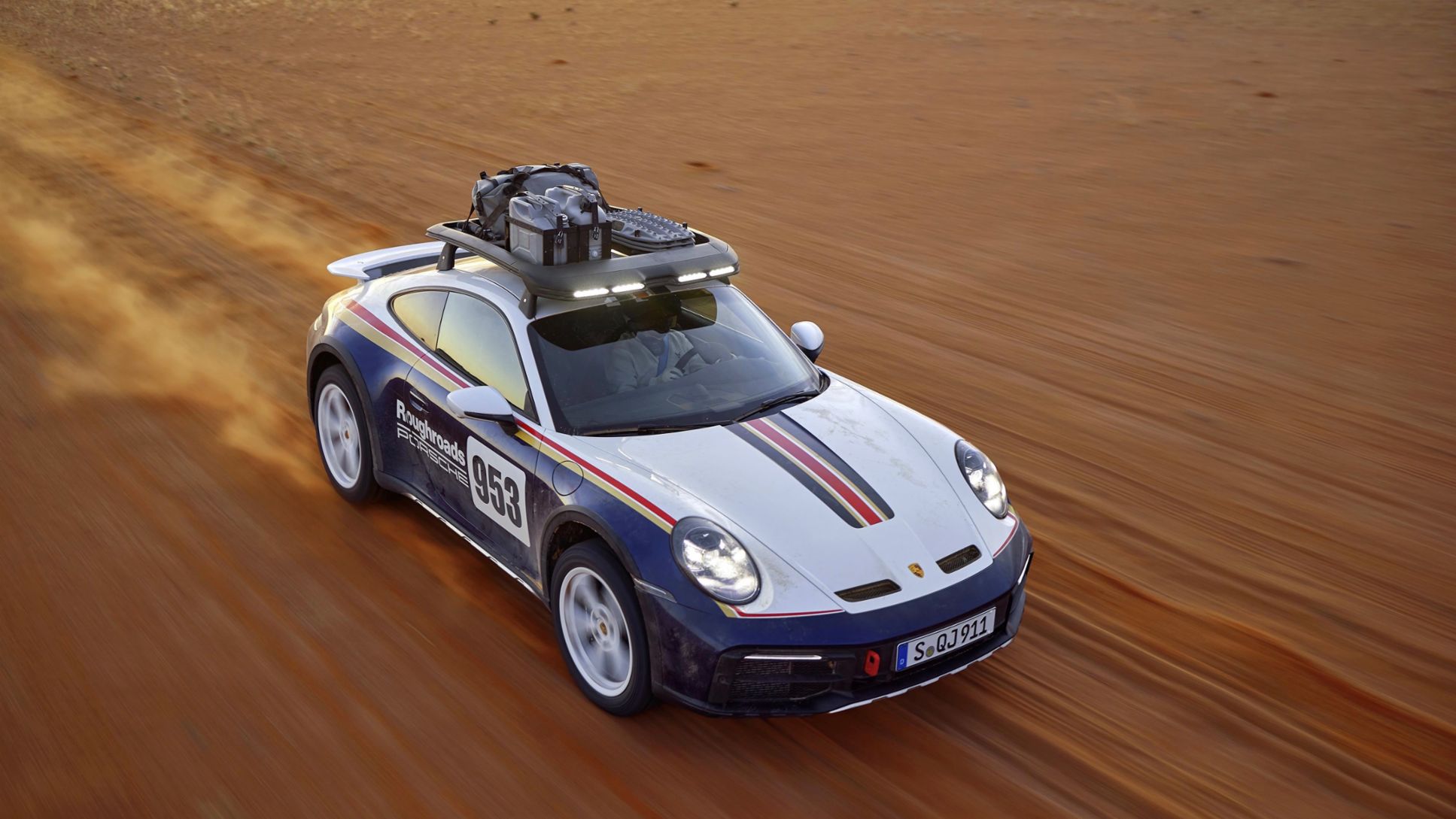Recalls the first Porsche overall victory in the Paris-Dakar Rally.
At the Los Angeles Auto Show in November 2022, Porsche presented the new Porsche 911 Dakar – a sports car that’s equally at home off-road as it is on it. The exclusive model, limited to 2,500 examples, shows that there are hardly any limits to the concept of the Porsche 911. The 911 Dakar pays homage the first overall victory by Porsche in the Paris-Dakar Rally of 1984, an event that also marked the birth of all-wheel drive in the Porsche 911.
Significantly increased ground clearance
One thing that immediately stands out is the ground clearance of the 911 Dakar: It is 50 millimetres higher than that of a 911 Carrera equipped with sports suspension. In addition, the standard lift system can raise the ride height by a further 30 mm. Its ground clearance and ramp angle rival those of conventional SUVs. The lift system is not designed merely for driving over obstacles at low speeds, but rather it is an integral part of the re-tuned suspension. The ‘high level’ setting is available for off-road adventures at speeds of up to 170 km/h. Above that speed, the car automatically lowers back down to its normal level.
Body with off-road characteristics
Additional characteristic features of the 911 Dakar include the newly developed, fixed lightweight rear spoiler made of CFRP, and the CFRP front luggage compartment lid with striking-looking air vents taken from the 911 GT3. There are also standard-fit off-road details such as the red aluminium towing eyes at the front and back, the widened wheel wells and sills, and the stainless steel protective elements on the front, rear and side sills. The side air intakes on the redesigned front end are also protected against stone chips by stainless steel grilles. Carbon-fibre reinforced plastic, CFRP full bucket seats, omitting the rear seats, lightweight glass and a lightweight battery reduce its weight further, enabling the Porsche 911 Dakar to weigh in at just 1,605 kg – a mere 10 kg heavier than the 911 Carrera 4 GTS with PDK.
All-terrain tyres standard for the first time
Complementing the car’s sporty off-road attributes are specially developed Pirelli Scorpion All Terrain Plus tyres (the dimensions of which are 245/45 ZR 19 at the front and 295/40 ZR 20 at the rear). The chunky tread pattern is 9 mm deep, and the reinforced sidewalls and the tread consist of two carcass plies. All this makes the tyres of the Porsche 911 Dakar ideal even for challenging terrain, and they exhibit a high cut resistance. Yet at the same time, the tyre offers sports-car performance on asphalt as well. Pirelli P Zero summer and winter tyres, specially developed for the 911 Dakar, are available as an option.
Commanding power with compelling sound
The 3.0-litre () biturbo six-cylinder engine with 353 kW (480 PS) and a maximum torque of 570 Newton metres delivers superior performance with a compelling boxer sound. It propels the sports car from 0 to 100 km/h in 3.4 seconds and reaches a top speed of 240 km/h (limited by the all-terrain tyres). Power transmission in the all-wheel drive sports car is provided by an eight-speed PDK.
New driving modes and Rallye Launch Control
The standard equipment also includes rear-axle steering, the exceptionally performance-oriented engine mounts from the 911 GT3 and the PDCC anti-roll stabilisation. Maximum off-road performance is also ensured by two new driving modes (in addition to Normal, Wet and Sport), which can be selected using the rotary dial on the steering wheel. Rallye mode is ideal for loose surfaces and features rear-biased all-wheel drive. Offroad mode automatically operates at a raised ride height and with a significantly stiffer differential locking effect. The focus is directed at maximum traction in dunes or on hard, uneven ground. Both of the new driving modes also feature the new Rallye Launch Control, which allows wheel slippage of around 20 per cent.
Rallye Design Package with styling that echoes that of the 1984 Paris-Dakar-winning rally car
At the heart of the optional Rallye Design Package is a two-tone paint finish in White/Gentian Blue Metallic. Porsche is offering two-tone paintwork as standard for the first time. The red and gold stripes are applied by hand in Zuffenhausen in the Porsche Exclusive Manufaktur. On the side of the car, the customer can choose an individual race number between 0 and 999. In addition to the red and gold rally stripes, the 911 Dakar with Rallye Design Package – the appearance of which is based on the winning vehicle of the 1984 Paris-Dakar Rally – also bears the ‘Roughroads’ lettering on the doors. The term is a registered trademark and reflects the concept of the 911 Dakar and its suitability for driving off road. The white-painted rims and the red taillight strip, in contrast to the standard 911, round off the distinctive appearance. Further highlights can be found in the interior: the interior trims and the decorative inlays on the dashboard and the interior door handle are in Ceramica White. There is also extended Race-Tex and leather surrounds as well as seat belts and accents in Shark Blue.


